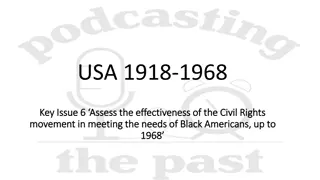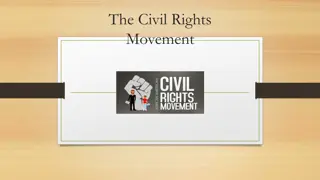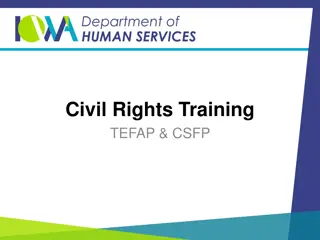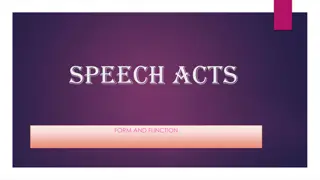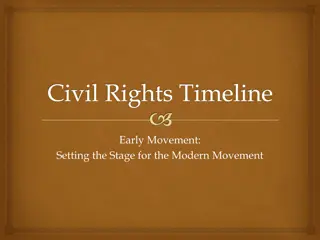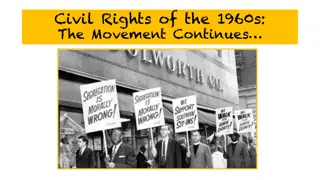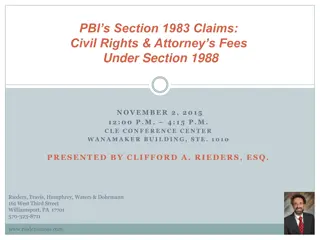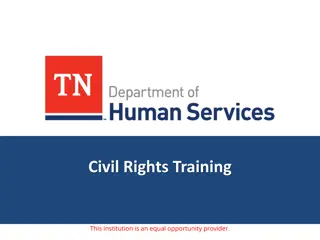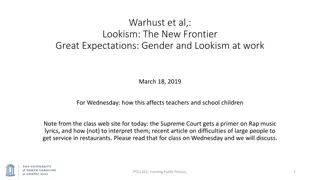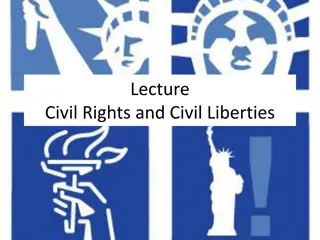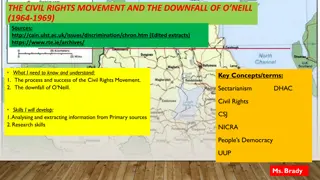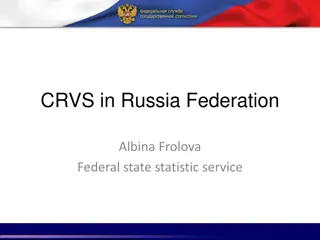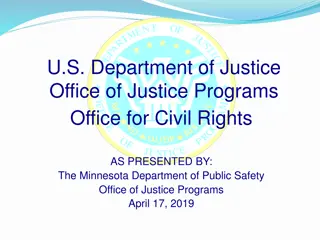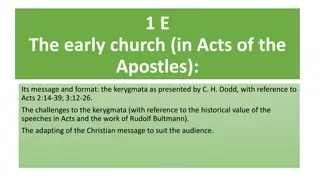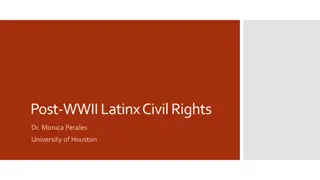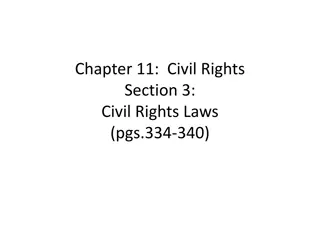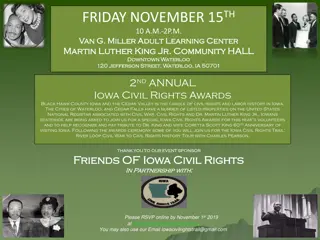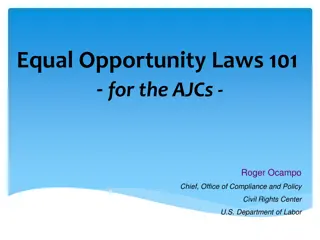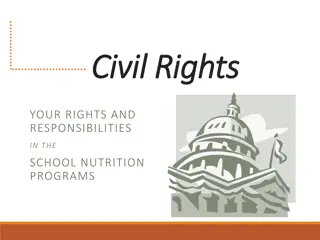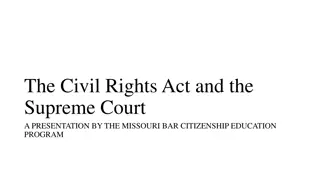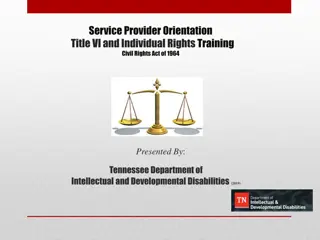Civil Rights
This content discusses the civil rights responsibilities of the Connecticut State Department of Education in school nutrition programs, covering topics such as accommodations, customer service, conflict resolution, and compliance with civil rights legislation. It also outlines legislation addressing
0 views • 70 slides
A Long History of Inequality. Civil Rights & Civil Liberties.
Explore the complex history of inequality in the United States, from the Civil Rights and Civil Liberties amendments to the Reconstruction era. Learn about the limits placed on government, the significance of the 14th Amendment, and the challenges faced during the Reconstruction period, including th
2 views • 12 slides
Understanding Civil Society: Concepts, Challenges, and Implications
Explore the dynamics of civil society, from its dense network of groups to its role in democracy. Delve into the typology of Civil Society Organizations, the connection between civil society and democracy, and the unique landscape of civil society in Norway. Engage in thought-provoking discussions o
0 views • 9 slides
Fair Housing and Civil Rights Requirements for RAD Public Housing Conversions
Overview of the fair housing and civil rights laws governing RAD public housing conversions, including the purpose and authority of HUD's Front-End Civil Rights Reviews. The process involves upfront reviews of elements with civil rights implications to ensure compliance with laws such as the Fair Ho
0 views • 22 slides
The Effectiveness of the Civil Rights Movement in Meeting the Needs of Black Americans up to 1968
Assessing the impact of the Civil Rights movement on Black Americans up to 1968 reveals significant progress in ending racial discrimination and segregation, securing voting rights, and advocating for social and economic equality. Despite achievements like the Civil Rights Act of 1964 and the Voting
0 views • 36 slides
USDA Civil Rights Training for TEFAP Program
The USDA Civil Rights Training emphasizes the importance of training for state agencies, subrecipient agencies, frontline staff, and volunteers involved in the Emergency Food Assistance Program (TEFAP). It covers various aspects of Civil Rights compliance, including public notification, complaint pr
0 views • 48 slides
Understanding Human Rights: Overview and Evolution
Human rights encompass various aspects such as human needs, generations of rights, individual status, and the indivisibility of rights. Dr. Anna Ledzi ska-Simon discusses the translation of human needs into rights, the historical evolution of rights across generations, individual rights according to
3 views • 17 slides
The Civil Rights Movement: Struggles and Triumphs
Abolitionists fought against slavery, leading to the Emancipation Proclamation during the Civil War. Early protests against Jim Crow laws laid the foundation for organizations like the NAACP. Key events, such as Rosa Parks' arrest and the Civil Rights Act of 1964, marked significant progress. The Vo
0 views • 7 slides
Understanding Human Rights in Queensland Government Work
The Human Rights Act of 2019 in Queensland outlines protected rights such as equality, freedom of expression, and fair trial. All public service employees must adhere to these rights, ensuring decisions and actions respect human rights. This act applies to everyone in the Queensland Government, with
2 views • 13 slides
Understanding Civil Rights Training in Food Distribution Programs
Civil rights training in food distribution programs is essential to ensure equal treatment and respect for all recipients. Federal financial assistance recipients must comply with civil rights laws to eliminate barriers and discrimination. Annual training is required for workers to uphold the rights
0 views • 30 slides
Understanding Speech Acts and Politeness in Linguistics
This informative content explores the concepts of speech acts, including direct and indirect speech acts, and the role of politeness in communication. It highlights how speakers convey intentions through their utterances, distinguishing between different speech acts such as requesting, commanding, a
1 views • 11 slides
Evaluation of Civil Rights Obstacles for Black People in USA Up to 1941
The obstacles to achieving civil rights for black people in the USA up to 1941 were significant, including factors like the KKK's resurgence in the 1920s, divisions in the black community, legal impediments, lack of political influence, and popular prejudice. The KKK's influence over law and law mak
0 views • 24 slides
Civil Rights Training Overview for SMP Participants
This civil rights training presentation covers the goals of civil rights, discrimination, protected classes, examples of discrimination, components of civil rights compliance, and the importance of equal access for all participants in the SMP program. It emphasizes equal treatment, knowledge of righ
0 views • 36 slides
Early Civil Rights Movement: Abolition, Legislation, and Freedom
Abolitionist groups form to fight against slavery in 1775, leading to the establishment of the Pennsylvania Society for Promoting the Abolition of Slavery. Legislation such as the Slave Trade Act of 1794 and the outlawing of slavery by different states played a crucial role in the early civil rights
0 views • 58 slides
Challenges and Progress in 1920s American Civil Rights Movement
The 1920s in America saw significant changes in civil rights, women's movement, and prohibition. Civil rights encompass personal freedoms guaranteed by the U.S. Constitution, including freedom of speech, voting rights, and protection from discrimination. Violations of civil rights have occurred thro
1 views • 42 slides
Civil Rights Movement of the 1960s: A Historic Journey
The Civil Rights Movement of the 1960s was a pivotal time in American history marked by significant events such as the Freedom Riders, University of Mississippi integration, Birmingham Campaign, March on Washington, Freedom Summer, Civil Rights Act of 1964, Selma to Montgomery March, and the emergen
0 views • 12 slides
Understanding Section 1983 Claims and Civil Rights Attorney Fees
Section 1983 of the Civil Rights Act allows individuals to seek redress for violations of their constitutional rights by persons acting under state law. This provision does not create new rights but provides remedies for existing rights. The history of Section 1983 dates back to 1871 and has been in
0 views • 27 slides
Liberal Democracy and Citizenship: Rights, Duties, and Participation
Citizenship in liberal democracies entails equal rights, duties, liberties, and constraints, with a focus on civil and political rights. The entrenchment of these rights has been key in establishing popular sovereignty and individual autonomy. Civil rights, developed in the 18th century, centered on
2 views • 16 slides
Comparison of Ownership Concepts in the Iraqi and Louisiana Civil Codes
The preliminary part of the Iraqi Civil Code recognizes various rights in rem, including ownership, disposal, usufruct, use, habitation, servitudes, and leases. It details the concept of ownership, perfect ownership rights, and additional rights such as "surface right" and tasarruf. The Iraqi Code a
0 views • 5 slides
Civil Rights Training: Importance and Legal Framework
Civil rights training is essential for organizations receiving federal funds to prevent discrimination and ensure compliance with laws. This training covers legal authorities, compliance areas, and the importance of eliminating discrimination in programs. Understanding Title VI of the Civil Rights A
0 views • 47 slides
Evolution of Human Rights: From Ancient Times to Modern Era
Throughout history, ideas of rights and liberty have evolved, leading to the recognition of universal human rights in the modern sense. The concept of human rights can be traced back to significant historical events such as the English Bill of Rights, the Virginia Declaration of 1776, and the French
0 views • 7 slides
Human Rights and Citizenship Rights in Leisure, Sport, and Tourism: A Historical Perspective
This text delves into the intersection of human rights, citizenship rights, and leisure activities like sports and tourism. It explores the definitions, history, and declarations related to human rights, emphasizing the importance of allowing individuals the freedom to pursue leisure activities with
0 views • 20 slides
Overview of Civil Rights Laws in the US
This content provides an overview of Civil Rights laws in the US, focusing on the Civil Rights Act of 1964 and Title VII, which created protected classes against discrimination based on race, color, religion, sex, and national origin. It also mentions other laws protecting classes such as age, disab
0 views • 18 slides
Overview of International Human Rights Law and Treaties
This comprehensive overview delves into the foundations of international human rights law, exploring key documents such as the Universal Declaration of Human Rights, the International Bill of Rights, and various human rights treaties addressing discrimination, women's rights, children's rights, migr
0 views • 27 slides
Understanding Civil and Criminal Law Processes
Explore the differences between civil and criminal law, covering civil trial steps, Miranda Rights, pleadings, and more. Discover the nuances of civil trials, starting with a complaint, and criminal trials, which begin with an arrest. Learn about the Miranda Rights and the essential stages of a civi
0 views • 37 slides
Understanding Civil Rights and Civil Liberties in the United States
This educational lecture covers the definitions of civil liberties and civil rights, the historical nationalization of the Bill of Rights, and key aspects of the 1st Amendment concerning freedom of religion, the free exercise of religion, and freedom of speech and the press in American society. It e
0 views • 21 slides
The Civil Rights Movement and Terence O'Neill's Demise (1964-1969)
The Civil Rights Movement in Northern Ireland, spearheaded by organizations like the Campaign for Social Justice (CSJ) and the Northern Ireland Civil Rights Association (NICRA), aimed to address widespread discrimination against Catholics. The movement advocated for electoral reform, an end to housi
0 views • 10 slides
Civil Registration of Acts in Russia
Civil registration of acts in Russia is governed by key legislation including Federal Law No. 143-FZ and involves the state registration of various events such as birth, marriage, divorce, and death. Bodies responsible for registration are formed by public authorities of the Russian Federation, with
0 views • 24 slides
Understanding Communicative Acts on Social Networking Sites
Exploring the taxonomy of communicative acts on social networking sites, this work delves into the impact of design features that influence speech acts, commitment, and normative pressures online. By analyzing common families of communicative acts on SNSs, the research sheds light on how these platf
0 views • 29 slides
Civil Rights Obligations in Federal Funding Programs
Federal funding programs require adherence to civil rights obligations, as enforced by the Office for Civil Rights. This includes upholding non-discrimination laws such as Title VI of the Civil Rights Act of 1964, the Omnibus Crime Control and Safe Streets Act of 1968, Section 504 of the Rehabilitat
0 views • 63 slides
Early Church Message and Format in Acts of the Apostles: Kerygmata by C. H. Dodd
The early church's message and format in Acts of the Apostles, particularly focusing on the kerygmata as elucidated by C. H. Dodd, with references to Acts 2:14-39 and 3:12-26. Explore the challenges to the kerygmata and the adaptation of the Christian message to various audiences. Additionally, insi
0 views • 17 slides
Latinx Civil Rights Activism Post-WWII
Explore the history of Latinx civil rights activism post-WWII with a focus on the impact of political organizations, significant leaders, and strategies employed. Understand the changes in the United States resulting from the civil rights movement and learn from the lessons of Latinx civil rights hi
0 views • 14 slides
Overview of Civil Rights Movement and Key Federal Laws
The Civil Rights Movement of the 1950s and 1960s aimed to secure rights for African Americans through civil disobedience, leading to landmark events like Rosa Parks' protest and Martin Luther King Jr.'s iconic speeches. Federal laws, such as the Civil Rights Acts of 1957, 1960, 1964, and 1968, were
0 views • 10 slides
The Significance of Human Rights in the Modern World
Human rights are fundamental rights that belong to all individuals, are inalienable, indivisible, interconnected, and should be respected without prejudice. The Universal Declaration of Human Rights, adopted in 1948 after WWII by the United Nations, is a crucial milestone document emphasizing human
0 views • 5 slides
Celebrating Iowa's Civil Rights Legacy: 2nd Annual Awards Event
Join the 2nd Annual Iowa Civil Rights Awards event in Black Hawk County to honor volunteers and pay tribute to Dr. Martin Luther King Jr. and wife Coretta Scott King. The event includes an awards ceremony and a Civil Rights Trail tour to commemorate the 60th anniversary of Dr. King's visit to Iowa.
0 views • 5 slides
Understanding Equal Opportunity Laws and Civil Rights Acts
This content covers the importance of enforcing equal opportunity laws and civil rights acts to promote justice and equality in various aspects of society, such as employment, programs receiving financial assistance, public accommodations, and education. It delves into the mission of the Civil Right
0 views • 46 slides
Understanding Civil Rights in School Nutrition Programs
This content provides information on civil rights in school nutrition programs, including the rights and responsibilities of staff and participants, annual training requirements, goals to eliminate barriers, definitions of civil rights terms, how to identify discriminatory actions, protected classes
0 views • 24 slides
Enhancing Transparency in Human Rights Performance Measurement
This information focuses on initiatives like the Human Rights Measurement Initiative (HRMI) that aim to provide new data for researching and advocating human rights issues globally. The HRMI project, founded in 2015, collaborates with various stakeholders and is funded by philanthropic grants. It em
0 views • 19 slides
The Civil Rights Act of 1964 and the Supreme Court
In the 1960s, Congress passed the Civil Rights Act of 1964, a pivotal legislation that prohibited discrimination in public accommodations. This act represented a significant shift in focus towards minority rights. The Supreme Court's past rulings on the Civil Rights Act of 1875 influenced Congress t
0 views • 24 slides
Understanding Human and Civil Rights in DIDD Services
Protecting the rights of individuals receiving Department of Intellectual and Developmental Disabilities (DIDD) services is essential. This training covers Title VI and individual rights under the Civil Rights Act of 1964, emphasizing equality and access to programs regardless of race, color, sex, d
1 views • 31 slides




